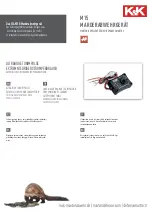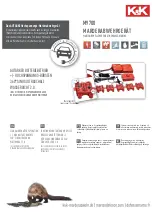
Warning
Never plug the charger into an outlet of other than the indicated voltage.
Plugging the charger into the wrong outlet could result in an explosion or fire.
Never insert or remove the charger while your hands are wet.
You may get an electric shock.
Do not use the T4PM transmitter’s battery as the receiver’s battery.
Since the transmitter’s battery has an overload protection circuit, the output power will be shut down when the high current load is ap-
plied. This may result in runaway or fatal crash.
Always check to be sure your batteries have been charged prior to operating the model.
Should the battery go dead while the model is operating, loss of control will occur and create a very dangerous situation.
To recharge the transmitter battery, use the special charger made for this purpose.
Overcharging could cause the battery to overheat, leak or explode. This may lead to fire, burns, loss of sight and many other types of
injuries.
Caution
Do not use commercial AA size NiCd and NiMH batteries.
Quick charging may cause the battery contacts to overheat and damage the battery holder.
Do not short circuit the battery terminals.
A short circuit across the battery terminals may cause abnormal heating, fire and burns.
Do not drop the battery or expose it to strong shocks or vibrations.
The battery may short circuit and overheat; electrolyte may leak out and cause burns or chemical damage.
When the model is not being used, always remove or disconnect the battery.
Leaving the battery connected could create a dangerous situation if someone accidentally turns on the receiver power switch. Loss of
control could occur.
Always keep the charger disconnected from the outlet while it is not in use.
10
F
o
r Y
o
u
r Safet
y A
s
W
e
ll A
s
That O
f O
thers
2QO\1L&G/L)HEDWWHULHVDUHXVHG
NiMH / NiCd / LiFe Battery Handling Precautions
Storage And Disposal Precautions
Warning
Do not leave the radio system or models within the reach of small children.
A small child may accidentally operate the system. This could cause a dangerous situation and injuries. NiCd batteries can be very
dangerous when mishandled and cause chemical damage.
Do not throw NiMH/NiCd/LiFe batteries into a fire. Do not expose batteries to extreme heat. Also do not dis-
assemble or modify a battery pack.
Overheating and breakage will cause the electrolyte to leak from the cells and cause skin burns, loss of sight, and other injuries.
Summary of Contents for T4PM
Page 1: ...INSTRUCTION MANUAL...
Page 136: ......











































